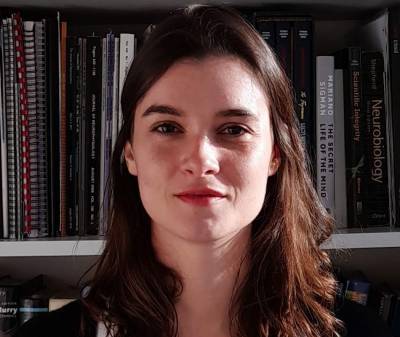Margot Tirole, MSc Brain and Mind Sciences (Dual Masters)

Job title: PhD in Neurosciences at UCL
Employer: UCL
Who did you find inspiring at UCL and why?
I have been very impressed by the quality of the lectures and research at both UCL and in Paris. UCL is one of the most prolific neuroscience hub in Europe with a long standing history of excellence. It is not unusual for some of the content taught in the lectures to originate from a research group at UCL or even sometimes from one of the lecturer’s own research group.
One of the key experience I had at UCL was participating in a research project at a level most people can only experience during an MSc. My host research project lab (the Bestmann lab) not only stimulated me intellectually but also entrusted me with all key aspects of the project. They guided me during data collection, analysis and involved me in weekly lab activities such as lab meetings. What made this experience particularly enjoyable was not only the quality of the science but also how incredibly welcoming the lab was. My personalised leaving-the-lab gift mug with cartoon drawings depicting the experiment attests to this quality! I believe that writing a paper with them has broadened my knowledge and opened great opportunities for me at the time of applying to PhD programs.
My fellow MSc Dual Brain and Mind students are also tremendously inspiring. Never have I met a group of people so passionate about what they were doing, and so supportive of each other. We are still in contact (if not still close friends!) 5 years later. Even though some of us have taken radically different paths – flight attendant, famous stand-up comedian, we all have been shaped by those two years spent together.
What is your fondest memory of your time here?
We all have fond memories of spending time together as classmates. We grew together and supported each other in the long hours cramming before a deadline in one of UCL’s many libraries. We also had great socials!
Tell us a bit about the work you’re doing now...
For my PhD at the Institute of Behavioural Neurosciences I split my time between recording neural activity in freely moving rodents while they do a variety of rewarded tasks – mainly looking for chocolate milk - and processing the neural data to better understand what might affect how well we remember things. We take advantage of the properties of place cells, which are thought be part of the ‘GPS’ of the brain – and were discovered by one of UCL’s Nobel Prize winners (John O’Keefe) - to study episodic memories. We can track those memories from the moment they are created to later on during sleep, which is when they get replayed again and again by various areas of the brain and become stable for long term use and form associations. I really enjoy the variety of tasks involved in this area of research: from wet lab skills to programming and dealing with large datasets.
How did your UCL degree help you get to where you are now?
Coming from a BSc in Physics, I took a leap of faith when I decided to study Brain Sciences. To be honest, I did not fully realise before I joined the breadth of topics and approaches that existed within Brain Sciences. Therefore, being able to choose from many different regular MSc course lectures, ranging from computational neuroscience to clinical neuroscience and psychology, has been an amazing opportunity for me. This range of lecture options is what sets the Dual Brain and Mind MSc apart from other programs at UCL.
Having both UCL and UPMC degrees not only gave me time to choose the topic I wanted to specialise in, but also gave me the research experience and degree recognition to successfully apply to prestigious PhD programs. It gave me confidence that I would be successful no matter the path I chose. I expect that being part of the UCL alumni community is going to keep on benefitting me for many years to come.
What have been your career highlights?
I have the privilege to work on exceptionally rich datasets - which always keep me on my toes – and I been able to travel to various places to hear about other people’s research (and be a tourist afterwards). As an academic, I am obviously very excited about the prospect of my research being published and sharing what I have learned. As part of my PhD, I have also had the opportunity to work on developing platform technology for early detection of dementia while I was an intern for a few months with a London start-up. This experience was a reminder that fundamental science can sometimes unexpectedly quickly lead to exciting new practical applications and solutions.
What would be your advice for current students?
Current students: work together and support each other, any career is also about the relationships you create with people and what you can teach each other. Do not be afraid to pick a couple of lecture courses out of your comfort zone, or of going to Paris if your French is not perfect – the year there will be worth it. It is ok to take time to figure out what you want to do, and explore something new. If you are currently studying for this MSc, you already have the skills enabling you to succeed in your future endeavours, whatever they may be.
 Close
Close

